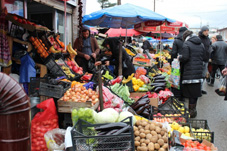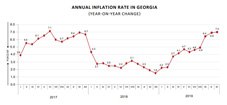Annual inflation still biggest challenge of economic policy at 7% in November
By Natalia Kochiashvili
Friday, December 6


On a monthly basis, prices were up by 0.9% in November. The annual inflation rate was driven by higher prices in the following groups:
Food and non-alcoholic beverages: Group prices rose 13.4 %;
Alcoholic beverages and tobacco: Prices rose 15.4 %;
Recreation, entertainment, and culture: Prices rose 7.0 %;
Hotels, cafes, and restaurants: Prices are up 7.4 %;
Transport: The group saw a 3.1 % rise in prices.
The monthly inflation rate was driven by higher prices in the group of food and non-alcoholic beverages (up by 1.2%); alcoholic beverages and tobacco (up by 2%); recreation and culture (up by 1.7%); clothing and footwear (up by 2.1%).
Prices for food and non-alcoholic beverages in Georgia increased by 1.2% compared to the previous month, contributing 0.41% of the overall monthly inflation.
The list of the top 10 product prices of which raised in November 2019 (compared to the same November 2018 statistic from Geostat.) looks like this: 1. Garlic prices increased by 128.4%; 2. Long-distance telephone bill - 68.3%; 3. Buckwheat - 64.9%; 4. Watermelon - 62.98%; 5. Apples - 45.5%; 6. Pears - 42.7%; 7. Peaches - 34.8%; 8. Herbs - 34.2%; 9. Orange -31.2%; 10. Locally produced cigarette w/filter - 30, 8%.
The numbers are alarming and the minister of economy and sustainable development, Natia Turnava commented on this issue after the government session yesterday, saying that for the sake of curbing inflation which happens to be “the priority of our economic steps”, ministry risks taking unpopular steps that sometimes might even be a deterrent to economic growth.
According to Turnava, the gov’t, together with the NBG, is doing everything in its power to ensure that price hikes do not burden a large part of the population.
Minister assures that with the various levers such as privatization, soil reform, and employment promotion, the gov’t will be able to maintain economic growth.
